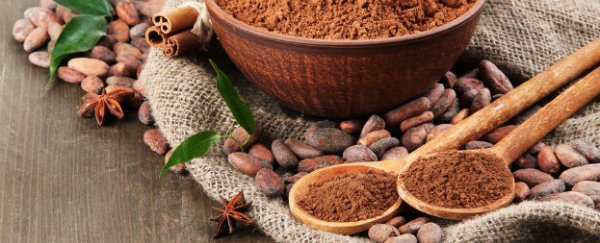A new study suggests that naturally occurring chemicals in cocoa can reverse age-related memory decline in healthy adults.
As people age, they typically experience a loss in memory. Previous research has shown that this normal decline in cognitive function is linked to changes in an area in the brain's hippocampus that's responsible for the formation of new memories, called the dentate gyrus. A team of researchers from Columbia University Medical Centre in the US has now shown that consuming cocoa could reverse these changes.
"Finding the cause-and-effect relationship was the main motive for the study but even though it wasn't our primary goal, we found that this dietary intervention can, in fact, ameliorate [improve] or even reverse age-related memory decline," said Professor Scott Small, lead author of the study, in an interview with Gary Stix from Scientific American.
The team investigated the impact of dietary cocoa flavanols - natural ingredients found in cocoa, on the function of the dentate gyrus. In the study, 37 middle-aged participants were randomly assigned either a high-flavanol diet (900 mg of flavanols a day) or a low-flavanol diet (10 mg of flavanols a day) for a period of three months. Though the flavanols are found in cocoa, you would need to consume 25 chocolate bars to get 900 mg of flavanols.
The participants underwent brain imaging and memory tests before and after the diet to evaluate activity and memory function in the dentate gyrus. The results revealed that the participants who had a high-flavanol diet had an increased blood flow to the dentate gyrus, resulting in improved function. They also had a 33 percent improvement in memory as measured by the memory tests than those who consumed the low-flavanol diet.
"If a participant had the memory of a typical 60-year-old at the beginning of the study, after three months that person on average had the memory of a typical 30- or 40-year-old," said Small in a press release.
The team plan to repeat the study with a larger group of participants to extend their understanding of the findings, including the optimal amount of cocoa flavanols needed to experience benefits to memory. They hope that this study will help to develop a formula for a high-flavanol product for commercial use.
According to Pam Belluck from The New York Times, "The findings support recent research linking flavanols, especially epicatechin, to improved blood circulation, heart health and memory in mice, snails and humans. But experts said the new study, although involving only 37 participants and partly funded by Mars Inc., the chocolate company, goes further and was a well-controlled, randomised trial led by experienced researchers."
The findings are published in Nature Neuroscience.
Sources: EurekAlert, Scientific American
